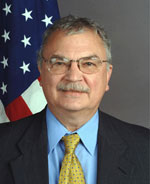A Quote by Robert C. O'Brien
Nowhere outside of Southeast Asia is China's rise as a global power more visible than in Africa.
Related Quotes
We traditionally in this world didn't have enough calories to feed all of us and had huge famines, not just in Africa, but had them across India, across Southeast Asia, and across China. Because of Borlaug's work at Simit and because of this we have huge excess, until very recently, in agricultural produce and the prices went through the floor.
As the CIA tried to find itself, the threat of international terrorism emanating from the Middle East, Africa, North Africa and Central and Southeast Asia grew with each strike: the first World Trade Center attack in 1993, the bombings of U.S. embassies in Kenya and Tanzania in 1998, and the 2000 attack on the U.S.S. Cole.



































